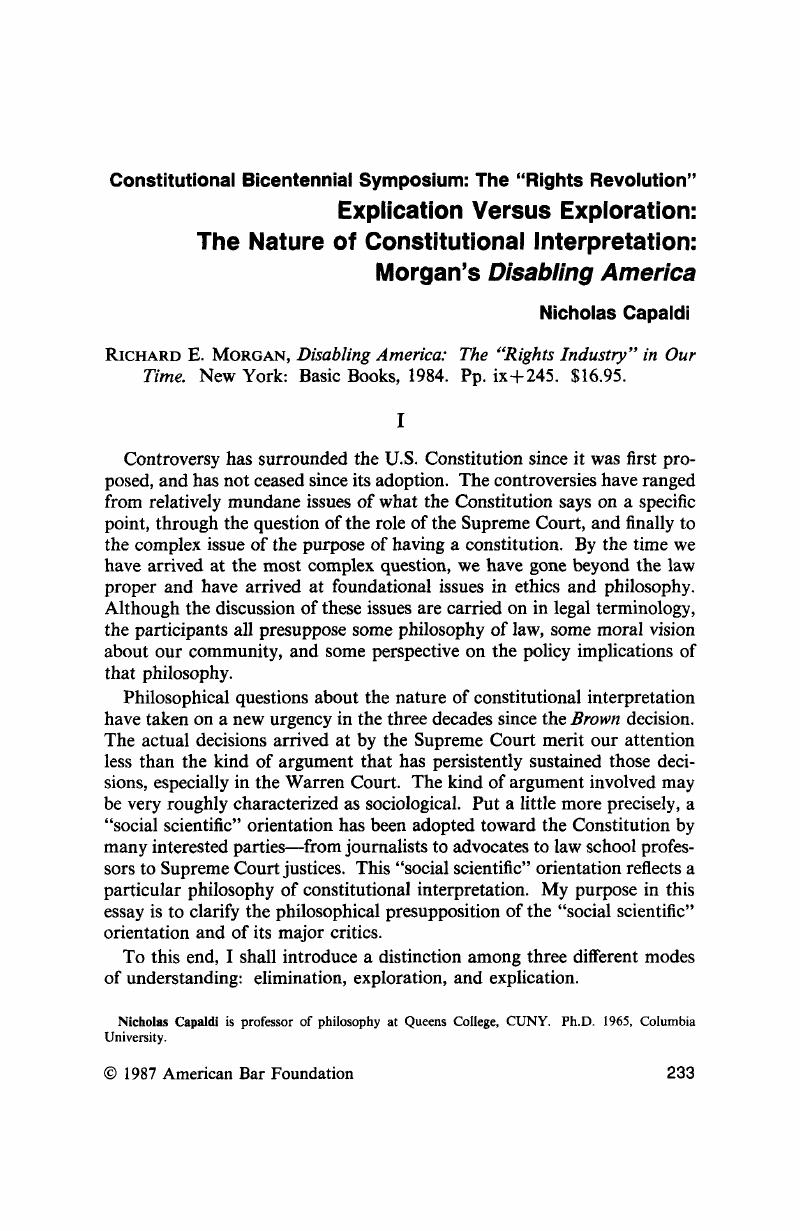Article contents
Explication Versus Exploration: The Nature of Constitutional Interpretation: Morgan's Disabling America
Published online by Cambridge University Press: 20 November 2018
Abstract

- Type
- Constitutional Bicentennial Symposium: The “Rights Revolution”
- Information
- Copyright
- Copyright © American Bar Foundation, 1987
References
1 The view of social science which models itself along the lines of physical science has had a long history of opposition from Kant, Dilthey, and German acknowledgment of the uniqueness of the cultural sciences (Giesteswissenschaften), Weber, hermeneutical tradition, Croce, Collingwood, Winch, Wittgenstein, etc.Google Scholar
2 This view dates from Bacon's claim that “knowledge is power” and is epitomized in Norbert Wiener's remark that it is now time to turn our technology on man.Google Scholar
3 This view is expressed by Wittgenstein in Philosophical Investigations but most especially in On Certainty (1969). It derives, ironically enough, from a point made long ago by Frege, who distinguished between a rule and the principle of its application.Google Scholar
4 K. Wittfogel, Oriental Despotism (New Haven, Conn.: Yale University Press, 1957).Google Scholar
5 See also Richard Morgan's earlier work, The Supreme Court and Religion (1972).Google Scholar
6 Holmes Lecture at Harvard Law School in 1969. Cited by Morgan at 43–44.Google Scholar
7 See also Lino A. Graglia, Disaster by Decree (Ithaca, N.Y.: Cornell University Press, 1976).Google Scholar
8 Quoted in Nicholas Capaldi, Out of Order 28-29 (Buffalo, N.Y.: Prometheus Books, 1985).Google Scholar
9 Id. at ch. 2.Google Scholar
10 N.Y. Rev. Books, May 15, 1980.Google Scholar
11 Hubert H. Humphrey, Beyond Civil Rights 410 (New York: Random House, 1968). At the time the book was published, Humphrey was the Democratic candidate for President.Google Scholar
12 John Hart Ely, Democracy and Distrust (1980).Google Scholar
13 Derrick Bell, The Referendum: Democracy's Barrier to Racial Equality, 54 Wash. L. Rev. 1–29 (1978-79).Google Scholar
14 Recall that Catholics have always presented a special problem in this context. Locke excludes them because, in a manner of speaking, they are agents of a foreign government. Even opposition to Catholics in the 19th and 20th centuries has come from conservative Protestants precisely because of unsureness about the issue of transcendent legitimacy. This kind of opposition is to be distinguished from opposition by left-wing Protestants.Google Scholar
15 John Rawls, A Theory of Justice 74 (1971).Google Scholar
16 Derek Freeman, Margaret Mead and Samoa: The Making and Unmasking of an Anthropological Myth (Cambridge: Harvard University Press, 1983).Google Scholar
17 Michael Oakeshott, Rationalism in Politics (1962).Google Scholar
- 2
- Cited by


